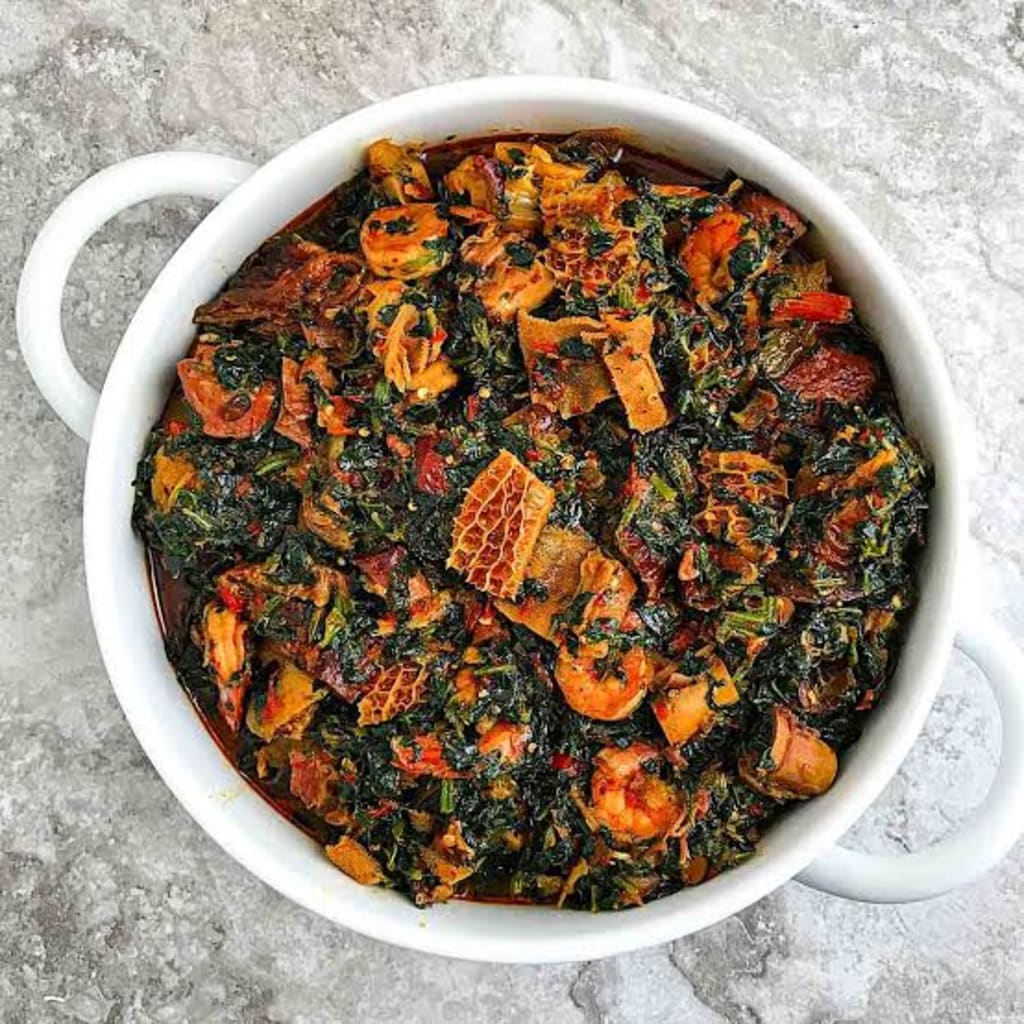The vegetable soup
Fresh and yummy Nigerian soup

In the vibrant land of Nigeria, there exists a rich and diverse culinary tradition that spans generations. Among the many delicacies that grace the tables of Nigerian homes, Yoruba vegetable soup holds a special place. This hearty and flavorful dish is a celebration of both culture and community, and its story is one that weaves together history, tradition, and the love of food.
The Yoruba people, renowned for their warm hospitality and deep-rooted traditions, have long cherished their vegetable soup, known as "Efo Riro" in their native language. Passed down through generations, the recipe is a testament to the love and care that Yoruba mothers and grandmothers put into nourishing their families.
The tale of Yoruba vegetable soup begins with the gathering of fresh and vibrant ingredients, carefully chosen to create a symphony of flavors. The heart of the soup lies in the use of dark, leafy greens such as spinach, kale, or amaranth leaves, which symbolize the abundance of nature and the resilience of the Yoruba people.
The process of preparing the soup is a labor of love, requiring patience, skill, and a deep understanding of the balance of flavors. As the ingredients are meticulously washed and chopped, the aromas fill the air, tantalizing the senses and beckoning loved ones to gather around the kitchen.
In a large pot, the Yoruba mother or grandmother begins by sautéing a medley of diced onions, garlic, and chilies, releasing a tantalizing fragrance that permeates the air. This foundation of flavors sets the stage for the rich and robust taste that Yoruba vegetable soup is renowned for.
Next, tender chunks of protein, such as succulent pieces of beef, goat meat, or fish, are added to the pot. The meat simmers gently, allowing its essence to infuse the broth, creating a base of savory goodness. For those who prefer a vegetarian version, the protein can be substituted with hearty legumes like black-eyed peas or cowpeas.
With each passing minute, the aroma of the simmering soup fills the home, drawing family members closer and generating a sense of anticipation. The Yoruba people believe that food is not merely sustenance but a means of fostering togetherness and strengthening bonds. The act of preparing and sharing a meal is a sacred ritual that brings loved ones together, nurturing both the body and the soul.
As the meat tenderizes and the flavors meld, a vibrant blend of diced tomatoes, red bell peppers, and palm oil is carefully added to the pot. The bright colors mirror the beauty of the Yoruba culture, symbolizing joy, abundance, and vitality. The palm oil imparts a distinctive richness, infusing the soup with its characteristic flavor.
Once the ingredients have melded into a harmonious symphony, the crown jewel of Yoruba vegetable soup is added—the dark, leafy greens. These tender leaves are carefully washed and chopped, their emerald hues adding a burst of freshness to the pot. With a gentle stir, they wilt into the broth, releasing their natural goodness and infusing the soup with vibrant nutrients.
At last, the Yoruba vegetable soup is complete. The pot is lovingly ladled into bowls, and the family gathers around the table, their eyes gleaming with anticipation. As spoons meet the lips, flavors explode on the palate, evoking a chorus of "mmm's" and smiles of delight.
Through the communal act of savoring Yoruba vegetable soup, the traditions and values of the Yoruba people are celebrated and passed down. With each generation, the recipe is shared, adapted, and cherished, ensuring that the flavors and the stories endure.
And so, the tale of Yoruba vegetable
About the Creator
OMOLE VICTOR
I’m VICTOR OMOLE,a motivated writer from ekiti state






Comments
There are no comments for this story
Be the first to respond and start the conversation.